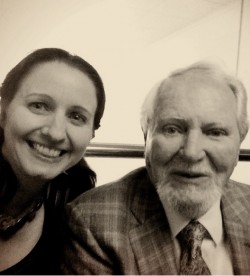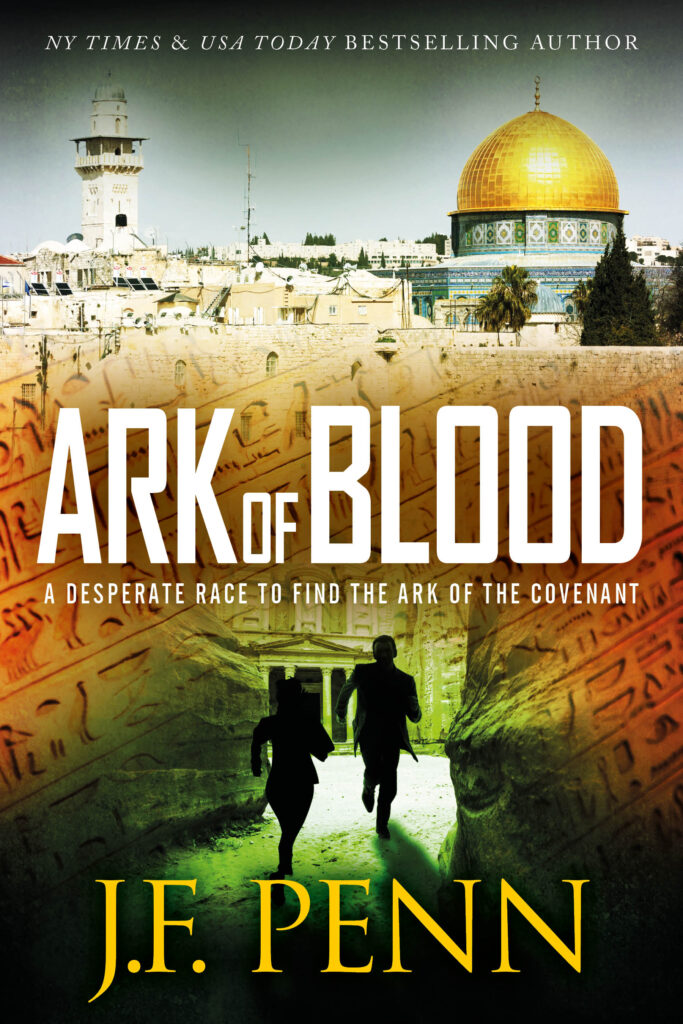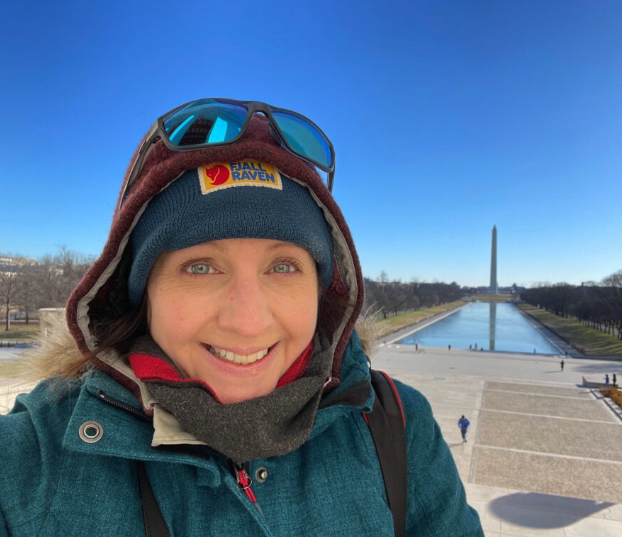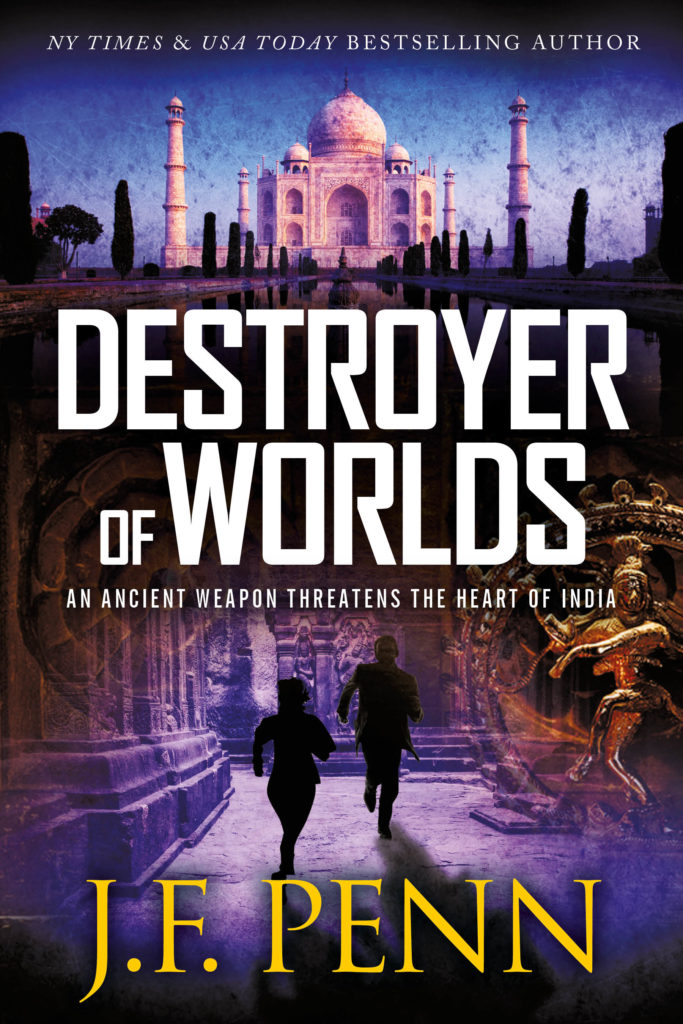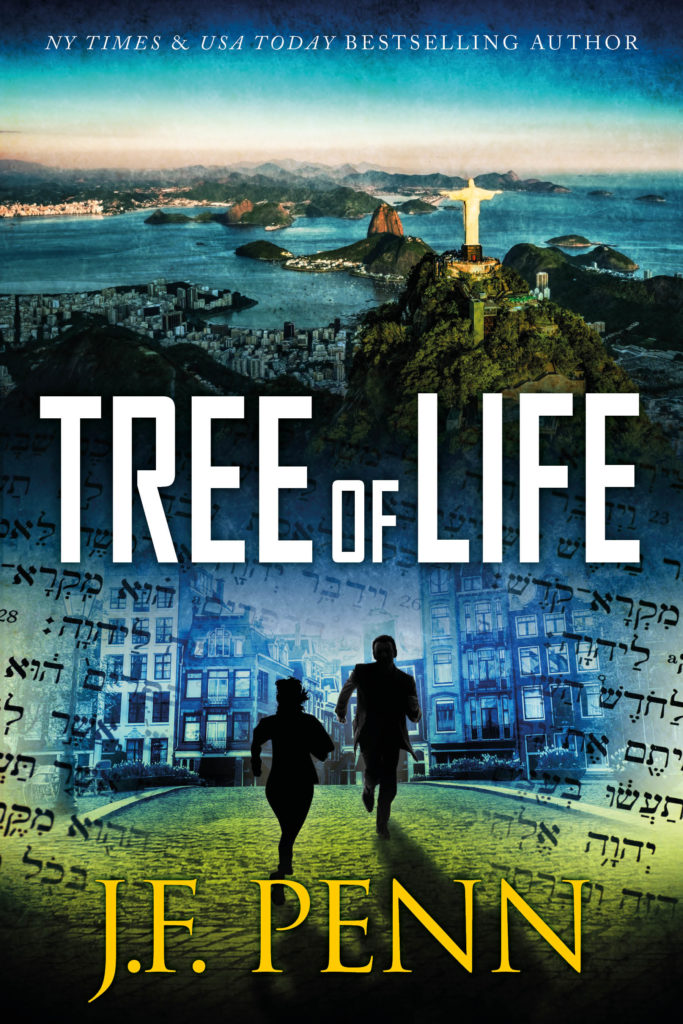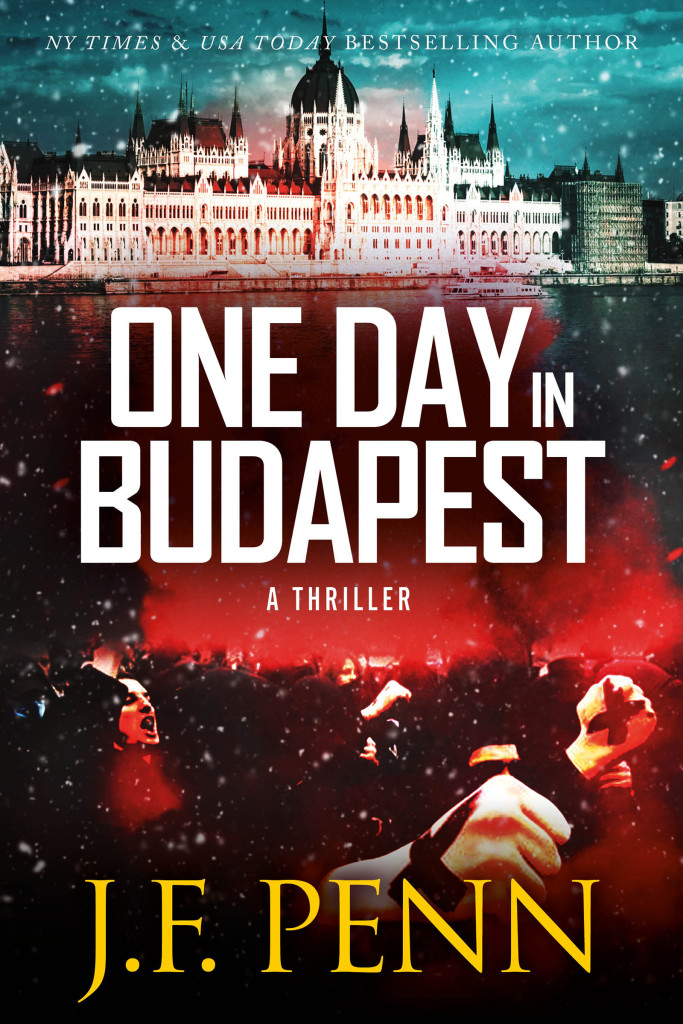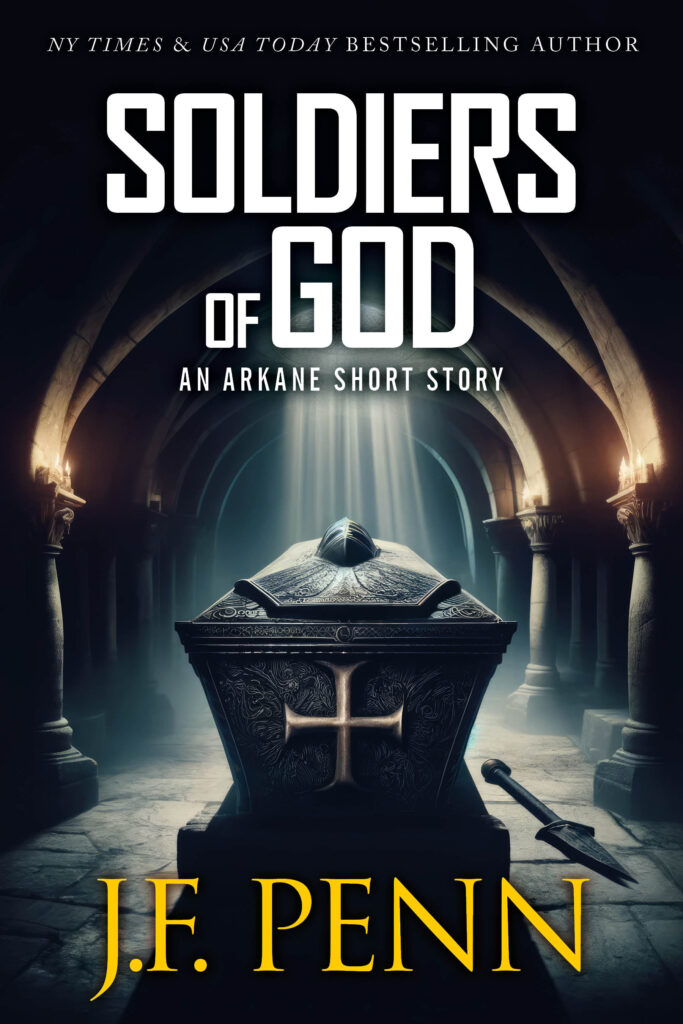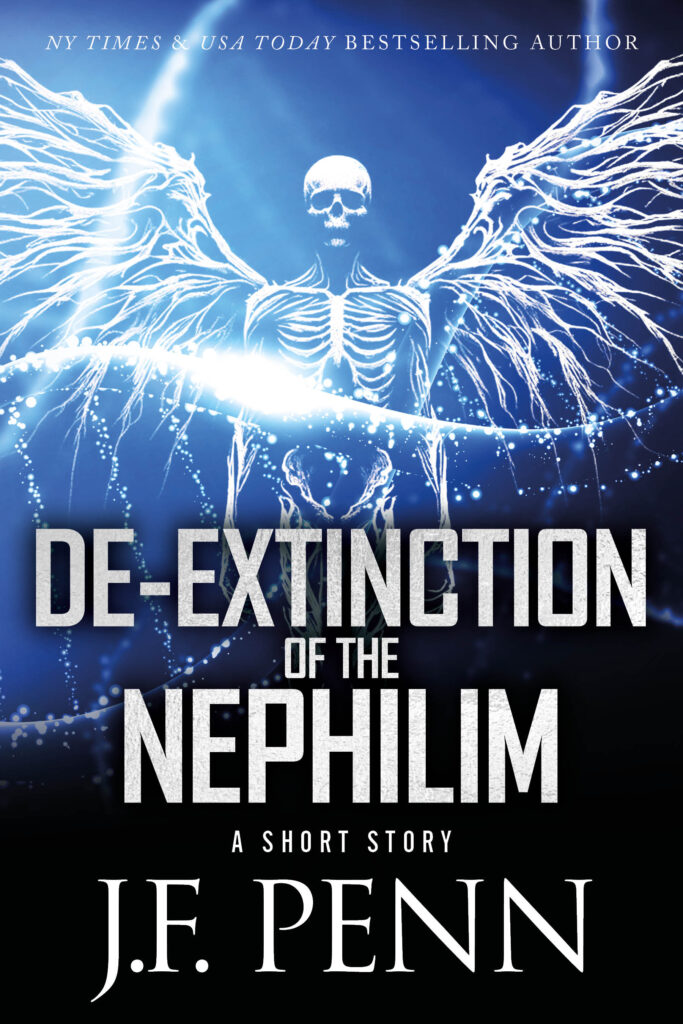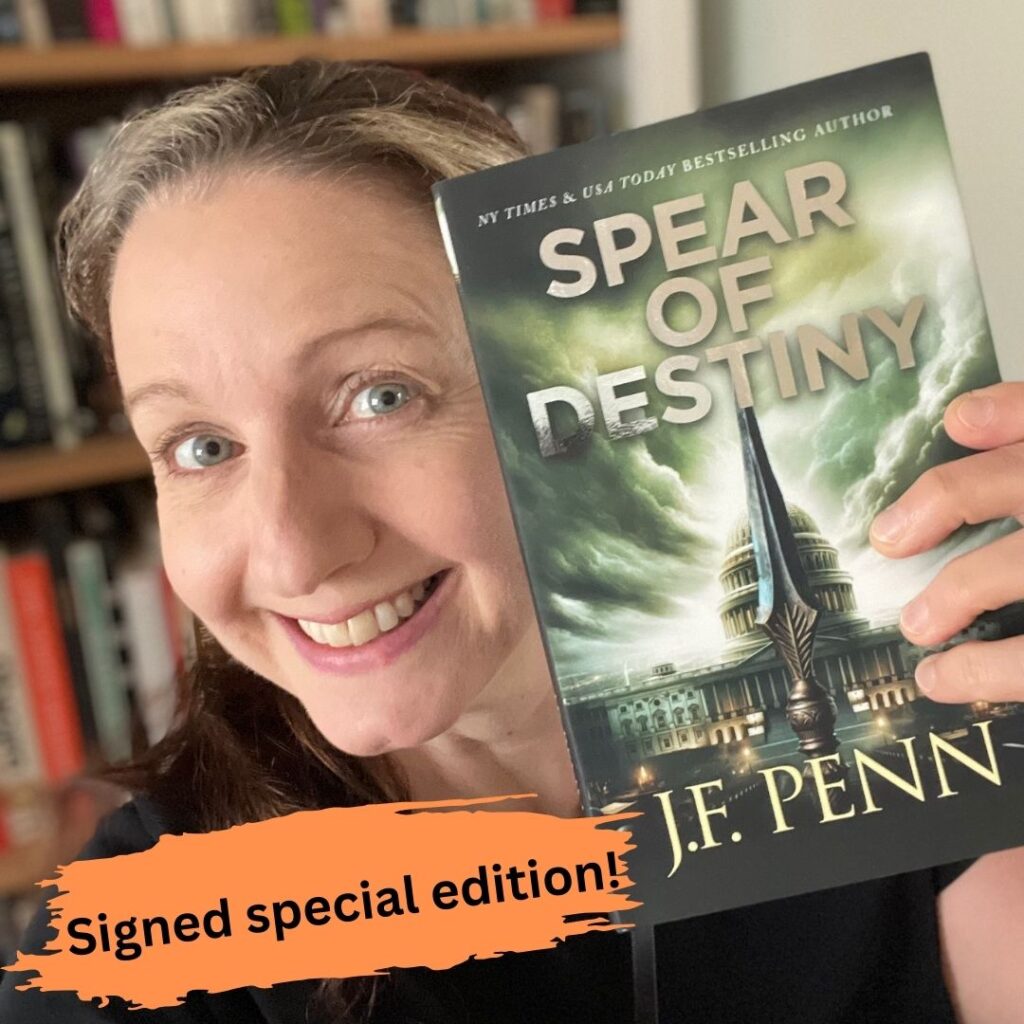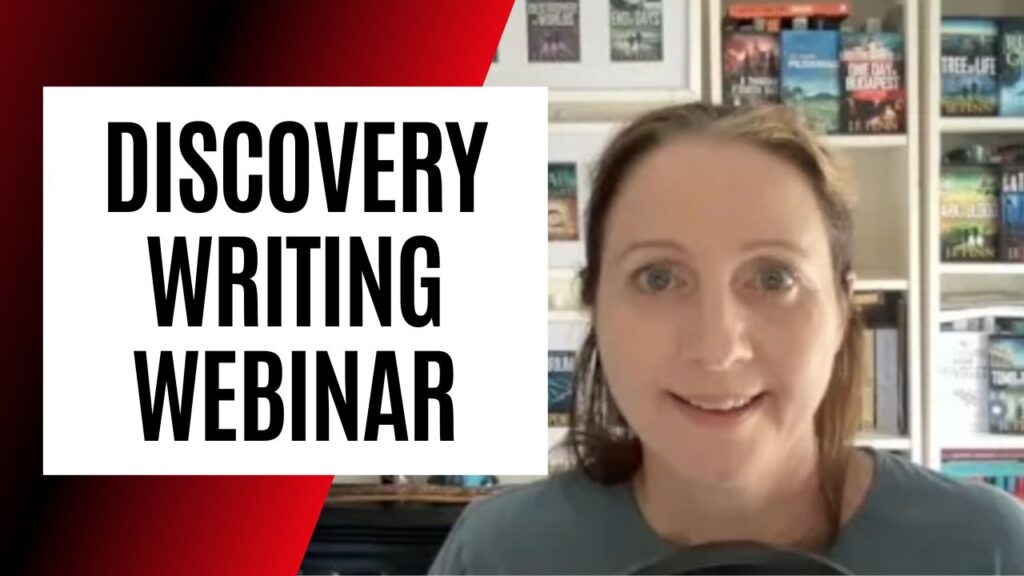In May 2024, I was interviewed for the Ancient Heroes Podcast about my inspiration for writing modern thrillers based on ancient relics, historical places and artifacts, as well as tips for writing a series and why Kickstarter is important for established and new authors alike.
You can listen below or on Spotify, Apple, or your favourite podcast app.
In this episode of Ancient Heroes, host Patrick Garvey welcomes award-winning, New York Times and USA Today bestselling author J.F. Penn. Known for her thrillers, dark fantasy, crime, horror, and travel memoir, Penn introduces her latest novel, Spear of Destiny.

The discussion covers Penn’s background in theology, influences from authors like Clive Cussler and Dan Brown, and her journey from a corporate job to becoming a full-time writer. Penn delves into the research and travel that fuel her novels, sharing insights on the historical and modern elements she incorporates into her stories.
They also discuss the role of Kickstarter in publishing, allowing for special editions and closer reader interaction. The episode is an insightful exploration of combining history, mythology, and thriller writing.
- How Jo got into writing thrillers and some of her inspirations
- The inspiration behind Spear of Destiny
- Book research and travel for writing
- The importance of series in a writing career
- Incorporating modern archaeology and technology, including AI and de-extinction
- Why Kickstarter is important for established authors and new authors like.
You can find Jo’s Spear of Destiny Kickstarter here, and Patrick’s The Heir of Achilles Kickstarter here. Both books will be on all the usual platforms later this year.
Transcript of the interview
Patrick: Hi everyone. Welcome to Ancient Heroes. Today. I’m so excited to have J.F. Penn on the program. She’s the award-winning New York Times and USA today bestselling author of thrillers, dark fantasy, crime, horror and travel memoir. She also writes nonfiction for authors as Joanna Penn and is the host of The Creative Penn Podcast.
Her upcoming novel is Spear of Destiny, which when this podcast airs, it’ll be available on Kickstarter. So Joanna, it’s so great to have you on. We have all these common things happening with us in our journeys through history and writing. So it’s awesome to meet you today and to be able to talk to you.
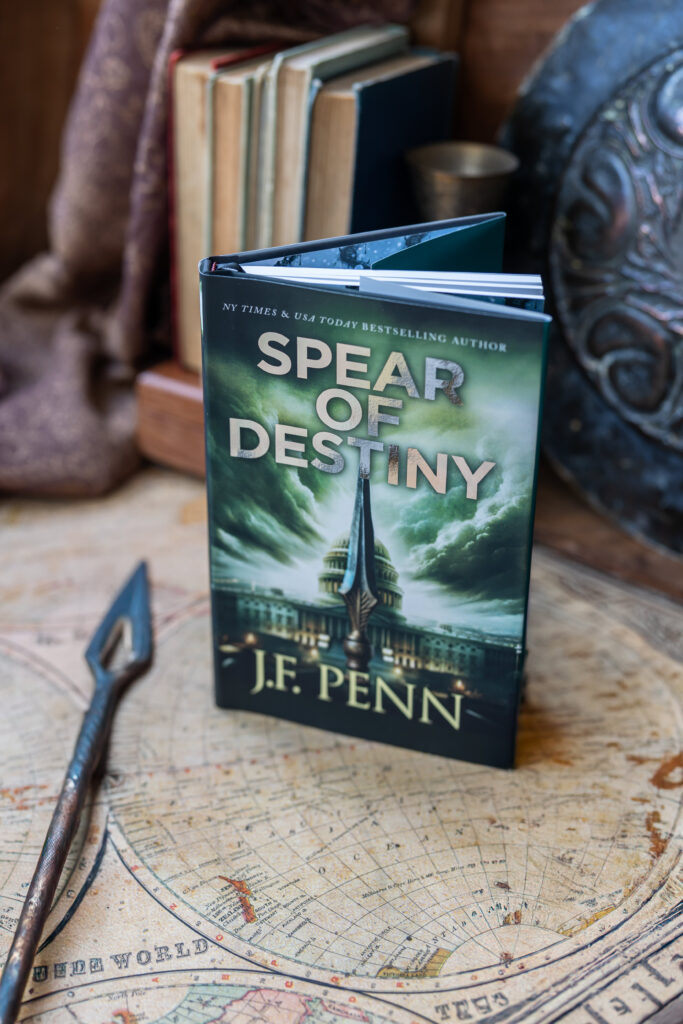
J.F. Penn: Thanks for having me on the show, Patrick, and yes, it seems like we share a lot of influences with The Da Vinci Code and Indiana Jones and action adventure and archeology and travel. So I’m really excited to talk to you today.
Patrick: I should tell listeners I initially discovered Joanna through her podcast at The Creative Penn, which is geared toward authors as I was writing, and then when I discovered her fiction writing, I realized it was in a very similar genre to what I’ve been working on. And I dove right into that.
I read Tomb of Relics, which is part of the ARKANE series, which we’ll talk about, and it was just absolutely perfect. I loved it. And now, yeah it’s awesome to talk to you.
Can you tell us about your background and how you got into writing thrillers, but with so much rooted in history and mythology?
J.F. Penn: Probably like many readers of this genre, I grew up with Clive Cussler, and read a lot of the Dirk Pitt series.
And I also always loved the James Bond movies. Even the old ones. I always liked the action adventure fast paced things, but there were never enough with female main characters. I knew I was always going to write that.
But early on I did a degree in theology, so I have a Master’s in Theology from the University of Oxford. People might tell from my accent, I’m British. And that degree, I’m so fascinated with religion, religious history, I love architecture, I love sculpture, and so all of that just started to come into my world.
And then I started a real job, like most of us, I started implementing accounts payable into large corporates.
I had a classic corporate job, and I got to my mid thirties and I just hated it. I was like, what am I doing with my life?
And I looked at what I really enjoyed doing. I really enjoyed reading. I enjoyed traveling, and I enjoyed writing. And I was like, do you know what, maybe I could make a career as a writer. What was amazing is around this time when I was questioning what I wanted to do, the Dan Brown books were really big. Another author called James Rollins. Crichton’s books. I love Michael Crichton. He used to weave his travels into his writing.
When Dan Brown’s books became popular, I was like, ‘oh my goodness, you can actually write religious conspiracy thriller and bring in history and art, and all of this stuff and culture.’ And I thought maybe I’ll give that a go.
I wrote the first book, Stone of Fire in 2009, and then published in 2011. It was originally called Pentecost and it’s now Stone of Fire. I rebranded later on.

But it’s so interesting because I feel like action adventure thrillers are a perennial interest. People would say it’s not very trendy, but I think people like us who love this stuff, we will continue to love this stuff and read this stuff, right?
I think I always wanted to be an archeologist in another life. But I did ancient history as part of theology, obviously. And that’s how it started. I did leave my job in 2011, so I’ve been a full-time creator author, entrepreneur since then. And I’ve written around 45 books over the last 15 years, and I love it. It’s just fantastic and I’m sure we’ll get into traveling for book research which is just so much fun.
Patrick: Yes. So I definitely want to talk to you about traveling, and I have the same thought about archeology. I talk to so many archeologists and historians and whatnot to the show.
I sometimes wonder, wait, is this a sign that maybe I should be an archeologist? But it’s actually great to just not be an archeologist, but be able to talk to them about what they’re studying and their specialties and things like that. Yeah, and you’ve probably experienced some of that too with you’re not necessarily having to focus on a super niche subject.
You can look at the broad range of things and find things that are interesting and just explore it.
J.F. Penn: Yes, and I think probably the reality is that the day job of an archeologist is not that sexy. And the books we write are around these exciting things that people discover. And I think the day job of an archeologist, like the day job of a writer, there’s a lot of days when it’s not super exciting. You’re just doing the work.
So I think we get the good side, but I certainly enjoy the research as I know you do around getting to know this stuff. But I get excited about the pinnacle of discovery as opposed to, I don’t want to do the day job of going with a toothbrush over some dirt.
Patrick: Let’s talk about Spear of Destiny. I started to read the early copy just yesterday. So I haven’t gotten through a ton of it yet, but I’m loving it already.
What is the Spear of Destiny and why did you choose this subject?
J.F. Penn: So the Spear of Destiny is the spear of Longinus who was the centurion who pierced the side of Christ on the cross according to the gospels and also the apocryphal gospels, some of the books that are not in the Bible for Protestants, but are in some of the other Bibles. The Gospel of Nicodemus actually names this Roman Centurion, Longinus.
And then there’s basically a patchy history as there is with most religious relics. Is it the Spear that the Emperor Constantine held up at the battles that he won? Did it help other famous people win battles like Barbarossa is named and Charlemagne, these people who supposedly had the spear and won great battles.
But why I got into it? I love religious relics. I love having an echo into religious history and places, but I also think it’s amazing that there’s about four or five different spears that are supposedly the Spear of Destiny.
But the one in Vienna, which I actually went to visit and go and see actually is originally a Roman spear. It is a gladius and then over the years they’ve added wire and gold and other things, and copper, so it looks more ornate. But underneath it all, it is a Roman spear and there is a nail in it, supposedly from the cross.
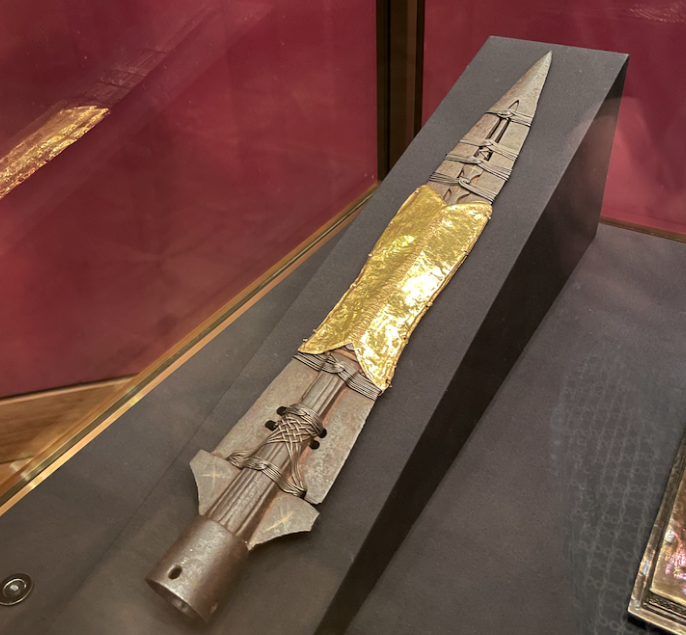
But why I got into this was I wanted to go to Vienna. So I went looking for something interesting that was in Vienna, and I found the spear.
And then I discovered that Adolf Hitler, who was of course Austrian, during his early years, he got rejected from the art school there. But he spent his time in Vienna selling his watercolor paintings on the streets, and he used to go and look at this spear. He knew the myths that the person who controlled that spear would have military might and power.
And one of the first things he did when he took power in Germany in the 1930s was he took the spear back to Germany. And I just thought, oh my goodness, that is absolutely crazy. I have to know more about this.
And then the other weird thing is that he lost control of the spear. Within the last days of the war, just before he committed suicide. So the myth of the spear and the history of it, I just thought, oh, this is too interesting.
Patrick: I love that. That’s great. And there’s this great parallel here with. Raiders of the Lost Ark which is the gold standard in this genre in some ways in storytelling and I don’t know a ton about Christian religious relics.
We’ve heard of the Ark of the Covenant and the Holy Grail and things like that. I got really excited when you’re bringing in this new relic that I’d never heard of, but that has this historic, interesting historical story behind it. That’s really compelling. That’s a great basis. That’s going to suck someone like me in right away.
J.F. Penn: Yes. And then I guess what we both do as well is turn this into a modern story. ’cause all my books are modern. They just have these links back into history as yours do. And most of everything I write comes from truth. I find historical evidence and books and things about this.
But for this one I proposed that they split the real spear into several pieces and then hid them in different places. And then looked at some of the historical evidence for where the Nazis had various trips and research trips.
For example, they went to Tibet and I didn’t really know they went to Tibet, and I really looked into some of what happened over there in the 1930a and things that are fascinating that we didn’t necessarily know about but that we can bring into the present day.
But I will tell you, I have written my ark of the covenant book, that is Ark of Blood, which is book three in the ARKANE series.
And I gotta tell you, since you are just starting in this series, you’ll probably write an Ark of the Covenant book. It is one of those things that we all do.
Patrick: That’s great. And I’ve already brought it up in multiple conversations with archeologists and some, like talking about it and others say, I haven’t looked into that. It’s not something real archeologists really are as interested in. But there is a great mythology behind that as well.
Let’s talk about traveling a little bit. You mentioned that you went to Vienna. It sounds like your research process and idea development process involves you going to some of these places and really immersing yourself in what’s going on there and what these museums and different places and cathedrals are like, and things like that.
Can you talk about the importance of travel for research and how you approach it?
J.F. Penn: Obviously you can do a lot of research online, and I realized that a lot of people can’t travel around doing this stuff. I’m very lucky to be here in the UK, close to Europe, and so I went over to Vienna and I find that even though I had a plan, the plan was to go visit the Spear of Destiny in the Hofburg Museum where it is, but that I would also go to some other places and see what emerges.
I have actually on my wall here, it says “Trust emergence,” because sometimes you don’t necessarily know what the story’s going to be. So I went and saw the Spear of Destiny. It was crazy. There was no one else there. There was the tooth of John the Baptist. There were all these crazy things in the museum, and I was like, okay, this is weird.
But then what was very interesting is that I walked out of that museum, turned a corner, and there is this incredible library, the State Library of Austria in Vienna, it is just nearby. And so I went in there on a whim because I was passing and it was incredible.
And I just had to set a scene there and there’s a fight scene where the spear is taken. And I was like, okay. Wow. I never would’ve known that if I hadn’t gone there. And the other interesting thing is that I also wanted to bring in Washington D.C. So one of the other modern parallels is the rise of the right wing in the USA.
One of the characters in the book is a general who wants the spear, so he can use it as part of his campaign for the presidency of the USA, which, of course, has many parallels with your political system right now.
But I was in Washington, DC a few years ago and I went to the Library of Congress, which is fantastic, and wandered around there, and I was like, I have to use this in a story.
I don’t know what though, and what was amazing — I mentioned Tibet before —is that the rushes, the raw footage, of the Nazis in Tibet is in the Library of Congress in Washington D.C. as well as Hitler’s own personal book collection, which includes books on magic and the occult. And I was like, oh, wow. That is such a great coincidence, more like serendipity. Its synchronicity, as Carl Jung would say, but just super exciting.
I was able to link Vienna, Tibet, Washington, D.C. as well as some other places because things actually did happen that way. This is part of why I love to travel for book research.
Obviously I just love to travel and I take a lot of photos which are useful obviously to put on social media, but also I actually have color photos of things like the Spear of Destiny and some of the other research that goes into it.
And I always write an Author’s Note as well because a lot of my readers like us enjoy Googling after they’ve read the book. They want to know what’s based on fact, and I think that’s another hallmark of our genre is that we just love the research.
I’d probably say 80% of my books, I have actually gone to places and done real research. But some of it, obviously I can’t. For example, End of Days opens in a snake handling church in the Appalachian Mountains in the USA where people hold snakes in the name of God. And I didn’t go to one of those.
Patrick: Yeah. Wow. That makes sense. So this is involving ancient religious relics, world War II history and modern day thriller. So that’s a good three things that are going to attract a lot of readers.
J.F. Penn: Let me ask you, because of course you have done an amazing trip to Greece. So tell us about that and what you found there that you’re weaving into your novel?
Patrick: That’s a great question. I do have an extensive travelogue on the AncientHeroes.net website of a road trip that my wife and I made through Greece.
Now, I had already written most of the draft of The Heir of Achilles, which will be coming out later toward the end of the summer when I went. But I thought that would help me flesh it out and get an idea of some of these places in real life and improve some of the descriptions.
And it ended up that when we traveled north, we went through Thessaloniki and I ended up adding an entire part of the book set in Thessaloniki that really rounded out some of the kind of the plot and storyline and things like that and added some more action. And it did end up having a major impact, but I didn’t really know that at the time.
I had to work with an editor. It’s the first time I’ve written a fiction book like this, and so I had to do a lot of work with a professional editor to make sure I was hitting the right notes.
And I really love the idea behind the book, but actually executing it, as is a whole ‘nother story and it’s a craft. And I was playing catch up on some of those things, and especially Thessaloniki and the Royal Tombs of the Macedonians, outside of Thessaloniki really helped round out the second act of the book.
And so it did absolutely make an impact, and then there’s other places where I haven’t visited where I am researching online. The Sakkara Necropolis in Egypt is a good example. I would love to go there, but it just wasn’t practically possible for me to, in the last few years. And I have talked to historians about it. I have looked at a lot of different things online, and hopefully it has that sense of realism. It’s based on actual research. I do wonder, since I haven’t actually been there a little bit, what it’s actually mixing and matching these things is tricky sometimes.
J.F. Penn: I would say most of the readers haven’t been there either. And I think that’s what we’ve got to remember. Neither of us are actually writing historical fiction. And people get very upset with that. So if you’re setting a book in ancient Egypt. In Sakara back in the day, you would have to get the dress right and the language and all of that, whereas we are writing a modern books that call back to that.
I do feel like it is important to avoid stereotypes when you are writing other cultures.
So for example, I wrote a book called Destroyer of Worlds, which is mostly set in India, and I’ve traveled to India several times. I love India. But I actually had an Indian reader read the book because I was aware that perhaps I might come up with some stereotypes about people who live in Mumbai.
And so she read it and she did find one thing that the taxi was the wrong type of color. But I think this is a tip for you and anyone you know, if you want to write a book is you can find people often in our own audiences who are experts in these areas. So that’s always a good thing to do.
But I guess what’s fun is that you and I, we love our research. And I know I probably do too much research. I can end up reading so many books.
We’re very lucky, obviously to have TV channels. We can watch documentaries like that snake handling church, I mentioned, I wrote that scene based on a two hour documentary, but it wasn’t even a documentary, it was just a video of a snake handling church on YouTube. It was their religious service. I watched hours of these churches until I was able to get into the vibe of the character who was at attending one of these churches.
I think that’s part of why we do this job is that we want to learn, and we want to share our learnings, but in a fun way, like in an action adventure thriller.
And so people listening, you don’t have to get serious about the research. You can just enjoy the adventure. But if you want to go further, then we hope, I guess that the truth is underneath.
Patrick: Absolutely. And I feel like it’s our job as the authors to make sure it’s a fun, thrilling, and you almost don’t even notice how much you’re learning here or there, or, it’s never meant to get bogged down in the research. And that’s what, in my earliest drafts before I had any professional help, figuring out how to take three pages of research and backstory and that ends up being one or two lines in the actual book.
It was a long process, but I understood that it had to go through that so the reader is enjoying the experience, and the story keeps moving along. And you’re just immersed in this world and you don’t feel like it’s an academic kind of thing learning about this stuff.
J.F. Penn: Yes. Although I think, again, we can balance that because we have an author voice and our author voice, for me, certainly I go deeper in some areas, into some of the history, some of the culture, some of the religious aspects I write partly to think about the deeper questions of life.
We both mentioned Dan Brown, we like his books but he needs editing around the history and going a little bit over the top with his description and all of that. But I do think there is a balance. I totally agree with you.
It is a thriller, so it has to move at a fast pace, but also the rich background brings our author voice, which our readers love.
It takes a few books to get to that point. It was probably book five when I was like, oh, okay, this is how I write. I actually write deeper in terms of mythology and religion and history and culture, and that’s what I love.
Not everyone is our reader. I think that’s really important. But over time, we get to understand what we love, what they love and we write for them.
Patrick: Wow. You mentioned that you had written a previous book that related to the Arc of the Covenant.
What other historical relics or historical events or things like that have been inspiration for this thriller series?
J.F. Penn: We mentioned the Ark of the Covenant, and I traveled to Egypt and I was going tell you, the temple at Abu Simbel, which is at the very south of Egypt on the border of Sudan. That is just stunning. And I went there over 15 years ago now, more than that, 20 years ago I was there. It’s 13th century, BCE, Pharaoh Rameses II.
And I was there thinking, I have to write something here, and I wasn’t even a writer at the time. And then I was like, what can I write in ancient Egypt? That calls back to ancient Egypt. I know. The Ark of the Covenant!
The first one in the ARKANE series, Stone of Fire. It was originally called Pentecost and was about the bones of the apostles, and I think you’ve actually had someone on this podcast talking about that time after the death of Jesus and before the church.
The apostles died around Europe and the Middle East, and even in India and a lot of the bones are in churches. You can question whether or not they are the actual bones of the actual apostles, but places like Santiago de Compostela in Spain have been a pilgrimage site for a thousand years. And there are other places like Iran. I haven’t been to Iran. I would love to go to Iran, but there are political issues, obviously.
But also, I know you’ve had people on the show talking about Jerusalem. I write a lot about Jerusalem. I spent quite a lot of time there in the 90s, I worked on both sides of the conflict for peace — which clearly didn’t work out. But I write a lot about Jerusalem. I think it is one of the most dense cities in terms of blood and history and culture and different religions.
So yes, End of Days is about the serpent at the end of days. I write a lot about it also in Gates of Hell. All of my ARKANE books are rooted in Christian mythology and myth, except for Destroyer of Worlds, which is set in India and is a little bit different. I think we are inspired by our interests.
You mentioned how hard it is to write a novel. We wouldn’t be able to get through writing a novel unless we were so fascinated by the topic that we were willing to keep doing that.
Otherwise, we’d just travel places, take some photos, and be done with it.
Patrick: Absolutely.
J.F. Penn: Have you got ideas for later books in your series?
Patrick: That’s a good question, and a couple of people have posed that to me. I have very rudimentary ideas, but I’m really focused this summer, just going through this process for the first time. I’m really gonna be focused on the book launch. I think once the book is out there and I can start getting some reactions and feedback and things like that from this audience and others.
I do have a general idea of a next direction but I’m also very interested in the biblical archeology and biblical history. This keeps coming up on the podcast as I’m looking for subjects and different things. And there’s always that element too that I haven’t explored as much.
That’s one of the reasons I’m excited about Spear of Destiny. So we’ll see. But really nothing solid, but the first book, The Heir of Achilles, does definitely set up for future installments and there is definitely room for that. And I know that’s really at the end of the day, building a series where someone can follow a set of characters or a primary character through different adventures is really the blueprint for a successful career, so to speak, in this area.
J.F. Penn: Yes, and Spear of Destiny is book 13 in my own ARKANE series, although they can all be read as standalone. These kind of thrillers, generally you can read them as standalones as you say, the same characters or some of the same characters go through the series. This is what readers want and we are those readers. You and I are those readers.
I think if Dan Brown hadn’t been as successful as he had been like he doesn’t need to write any more books. He occasionally puts one out, but the bigger series, someone like Steve Berry, I think he’s on 20 plus books. James Rollins is on loads of books. Some of these series are, go on for, I think J. Robert Kennedy’s series is like on 40 plus books in his series. [Click here for a list of 20 action adventure thriller series you can binge right now.]
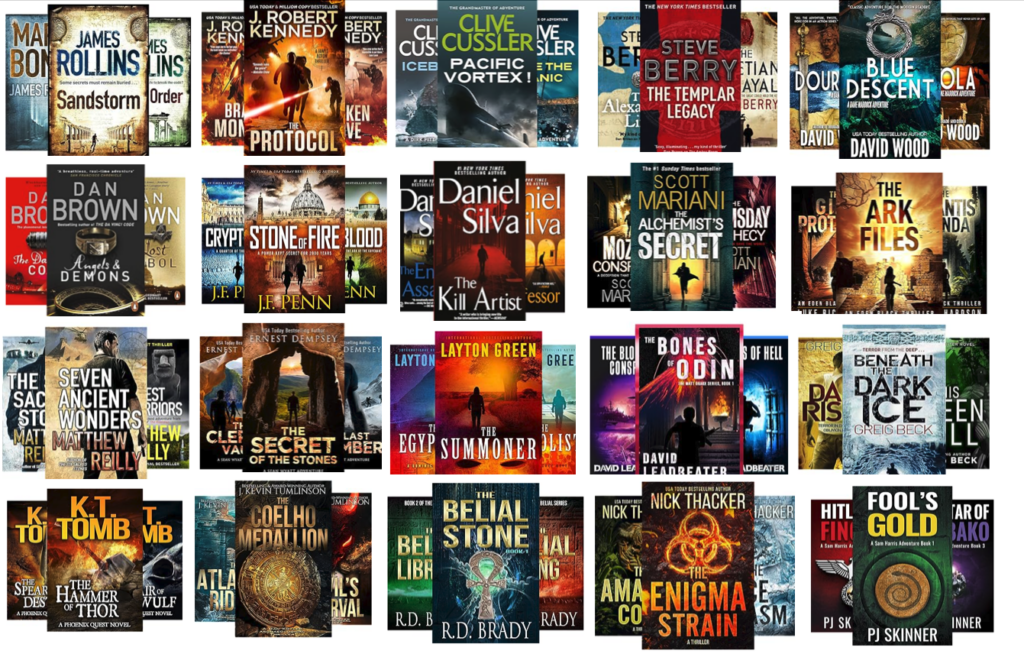
So there’s lots of us in this genre who love reading series and also writing them, and you are right, as a career, as an income, having a series is really good because if readers enjoy them, then they’ll keep coming back.
But again, we get into other things. I’ve written some crime, some fantasy, some horror, memoir. We get into other things as as our interest changes.
But it’s interesting you mentioned Belize. Tree of Life is inspired by the Portuguese Empire and the search for the Garden of Eden, and that ends up in my research. I didn’t really realize how big the Portuguese Empire was in Latin America. I know Belize is Central America, that kind of area. It was like, wow, this is so interesting.
So even though Tree of Life starts in Europe, it ends up in the far east, in Macau and it ends up in Latin America. And so it, it just is incredible how many countries are linked together by history and by these different objects that we can weave into stories.
I would also say to you, don’t be afraid of using the same themes as other authors. Like I said about the Ark of the Covenant, it’s a bit of a rite of passage because we all end up doing it, but we all have different characters and we all have different stories. So I don’t ever think there’s an issue. It’s like the same writing prompt that you give to people. People will always write different things and we bring different things to these stories.
Patrick: Absolutely. And I think more quality authors in this area only builds up the genre for everyone. It’s less about a competitive thing. Is someone gonna pick this book or that book? If they like this genre and this kind of storytelling and subject matter, they’re probably gonna read any of the top books in that genre over time. And I definitely yeah, agree with that.
J.F. Penn:
This is one of the most wonderful and difficult things of being an author. It might take you months or years to write a book. Someone will finish it within a day. And they’ll be like, where’s the next one?
And this is, I think what’s so fascinating you have the more books you have, even I’m doing bundles as part of my Kickstarter, where you can get the entire series, all the books, but still, 13 books, in a couple of weeks, if you read one a day and then you’re done. And it’s taken me more than a decade to write.
So I think that’s what’s so magical about our books and especially fiction. I find this very interesting, and especially I guess based on history and religion, is that we are writing things that don’t age based on things that are old and but people can pick up a book now that I wrote a decade ago, or Clive Cussler wrote 30 years ago, and it’s still fun and interesting. So that’s what I hope for my career anyway.
Patrick: That’s great. And I know that there are historians out there that don’t like focusing so much on certain relics or supernatural things and some of these ideas, but I also know that there’s a lot of historians that know that this stuff brings people in. It’s a gateway for people that may not have a, a lot of historical background, that they learn a little bit about something and they’re drawn into that subject matter.
If it weren’t for The Raiders of the Lost Ark or something like that. I may not have ever started looking into some of these biblical archeology. And then as you get further into it, you start learning the real history behind this stuff and the influence and so I do think it also helps just get people interested in history.
J.F. Penn: Yes, I think so. You hadn’t heard of the Spear of Destiny, and I had heard of it, but I did certainly didn’t know that there was one of them in the museum in Vienna. And it’s so funny ’cause I actually have talked to a lot of people about things to see in Vienna and nobody had mentioned the Spear of Destiny.
It’s a bit like, so I live in Bath in the UK and when I say I live in Bath, people think Bridgerton, which has a lot of things set in Bath or they think Jane Austen. But actually Frankenstein was written here. Mary Shelley wrote Frankenstein in Bath here in the UK.
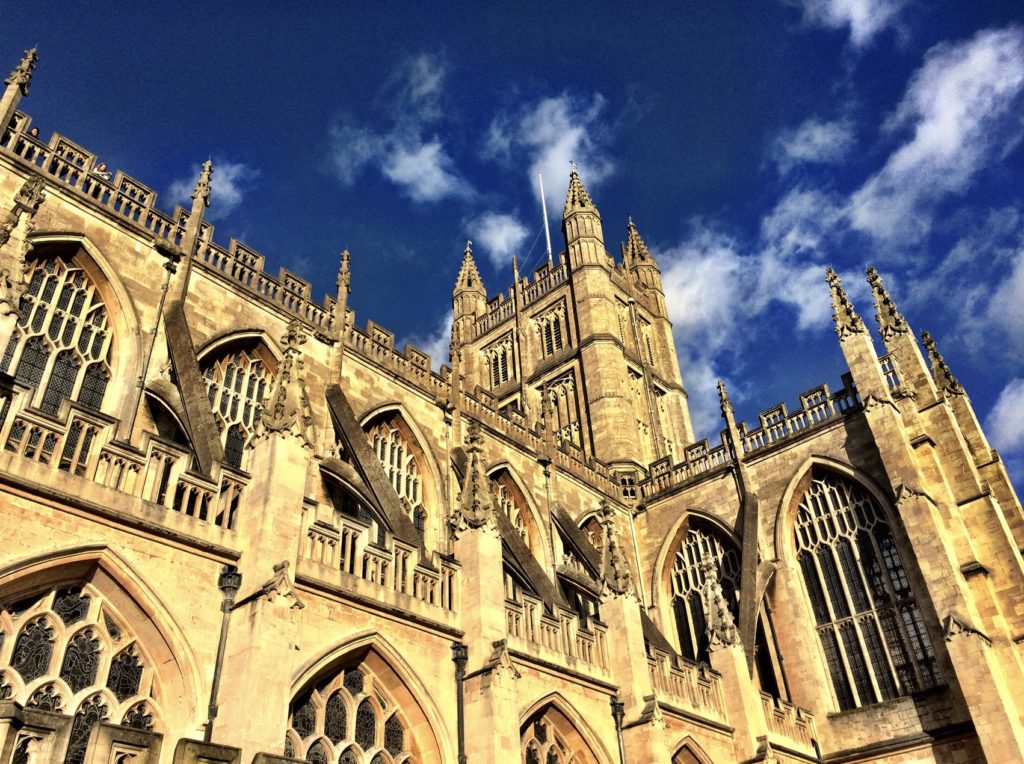
There are 2000-year-old Roman baths here with these cursed tablets that people used to throw in, bringing curses down on people. And I’m like, this is such a dark city. People think it’s all light and happy, but it’s super dark.
And so this is what I try and bring as well. There’s so much ‘click-baity’ stuff around what a place is. It’s meant to be a certain way, whereas I’m very interested in the darker side of history. I think that’s what I try and bring.
When I went to Vienna, it’s funny that I really ended up on what is a really dark phase in the history of Austria and the history of Europe, and yet the Spear of Destiny itself has this fascinating history.
Our aim is to bring a different perspective, and this is my challenge every time.
With the Ark of the Covenant, again, my challenge was, how do I make this different? You can’t write Indiana Jones again. You can’t write the same things that other people have written.
You have to know the genre well enough so that you then write something different. And to me, that’s the creative challenge.
How is my book going to be different to someone else’s book? What can you find in the historical research that spins it in a different direction?
And that’s why as a reader, I keep coming back to the genre because I’m fascinated by what someone else is going to think about in terms of that clue or that place.
One of my books is One Day in Budapest and people actually use that to go around Budapest.
Even though it’s a thriller, they actually use it to go and look at like The Holy Right. Which is this thousand year old mummified hand in the basilica. And things like that, which most people don’t know about until they read like books like ours.
Patrick: Awesome. I know you also integrate modern archeology and archeological methods and things like that into your books. Can you talk a little bit about how you learn about this stuff and how you incorporate it?
J.F. Penn: I am super fascinated with the use of AI in archaeology. I have a Q, like a James Bond Q character, with all the gadgets and things.
There was a Vatican digital scanning project that is still going on, scanning the archives of the Vatican, and this character was part of that project and discovered this ancient book and that led to the story in Soldiers of God.
But that I was like, oh my goodness, if you go and scan the stuff in the Vatican Secret Archives, what are you going to find? That’s really cool.
And then for this book Spear of Destiny, while I was writing it, it’s at ScrollPrize.org and basically there were these scrolls that they found in Herculaneum, which was buried with Pompeii back in 79 A D, and that buried them and they were carbonized. So these completely black sausages essentially, which are these rolled up scrolls that had been burnt so badly.
When they tried to unroll them, they just crumbled to dust, so they haven’t been unrolled for 2000 years. And then this prize was set up to use AI scanning technology to see into the scrolls.
So they would scan it and then use this cool technology and they’ve actually managed it. So I had to use that in the book. They found some really cool things by starting to read these scrolls that they’re on the second phase as we record this in May, 2024. They’re just discovering new things about it.
There is some other stuff with climate change as well and satellite imagery, they’re now being able to see things in different places. So they recently found some pyramids in the Amazon and also in Egypt, like new sites that haven’t been found before.
Another one that I’ve just written about is the genetic sequencing that they’re doing. They find these ancient things and then they’re bringing them back. There’s this company called Colossal Labs, which I kid you not, is a de-extinction lab for bringing back the wooly mammoth and the thylacine, which is the Tasmanian tiger. I used it as the inspiration for De-Extinction of the Nephilim.
They’re actually doing this. And of course they’re not bringing back the dinosaurs, but what is next? So I try and weave these modern technologies into the books as techniques for my characters to find out more and as the next thing.
Patrick: That’s awesome. Yes. That does sound like something like you would see in a Michael Crichton novel, Jurassic Park. And he has been a big influence on me just reading something where you go, we’re not quite there yet, maybe with some of the stuff in his books, but you go, this seems like it could be possible or it could be on the horizon, and then making a believable, fun story about it where you’re also learning some stuff.
So definitely, he had a big influence on me growing up that it was even possible to write a novel like that. It was just, that was like the epitome of a fun read. When you’re going, not only is it not only the character’s interesting and the story is interesting, but there’s also this premise behind it that is like blowing my mind, and so anyway, yeah he’s great.
J.F. Penn: I agree with you. And in fact, Jurassic Park is now what, over 30 years old or something, right? The book has a lot more about chaos theory, whereas in the movie, there’s just that one moment with the drop on the back of the hand, but in the book, he does go into chaos theory much more.
And again, I take that as encouragement for us that readers want more than just the action. They want more than just the thriller stuff. Now that is important because that’s our genre, but the other stuff, the relationships between the people, the historical stuff, the interesting things, people want that as well.
If you read a Michael Crichton book, it’s a lot more scientifically and historically dense than the movie adaptation. So I think we have to remember that you can put this stuff in the books. You just have to do it with a gentle hand, or some sprinkling as opposed to info dumps. The fun to me is getting into that and then trying to weave it into a story as opposed to, as you said, we’re not writing an essay, we’re not writing a nonfiction book.
Patrick: And I think that will especially appeal to listeners of this podcast who also have such an interest in nonfiction and learning, so having this blending of things is very interesting to me.
Tell us a little about your Kickstarter campaign and what you’re going to have going on for Spear of Destiny.
J.F. Penn: So I have a special edition which has silver foil on the covers.
Patrick: It looks beautiful for people listening. It looks beautiful. I can see that the shine on the text and everything through the screen.
J.F. Penn: Oh, good. Yes, I think one of the interesting things about Kickstarter for both authors and readers is that we can offer these premium products that are very hard to do otherwise.
When we publish and most people will buy a paperback in a book, in a bookstore or online. They’ll listen to an ebook read an ebook, or get an audiobook. And we don’t get to do really special stuff, but with Kickstarter we can do silver foil. This has got like a ribbon. It’s got custom end papers.
It’s got all the things that as a geeky author who loves books, like I’m just a bibliophile. I love books, and I wanted to make a beautiful book. I can also do signed first editions. This cover is a different cover. So there’ll be a separate cover once it comes out on Amazon and all of that kind of thing.
I’m doing basically an exclusive edition for Kickstarter, and the whole point is to do something amazing for my readers, but also to be able to offer bundles. So that’s the other thing is that people can buy the whole series in ebook audiobook print, which they can’t do anywhere else. You cannot buy that bundle anywhere else.
I’ve got a class on Discovery Writing.
I’ve got all kinds of different things and yes, so it’s great for readers. If people don’t know Kickstarter, we should say it is not a begging platform. It is a crowdfunding platform. Where essentially you are pre-ordering something really cool from a creator that you want to support.
You get the special edition early as well, so you might get it months before it’s available on the other stores.
It also means as a writer, as well as doing cool stuff, I also get the money more quickly, and that enables me to continue to do this as a job.
I’m sure people appreciate it’s a tough business being a creator. And so anything where we can do amazing things for our readers, but also make a higher royalty rate and receive money within weeks as opposed to months or even years, which is what happens to some authors, then Kickstarter is just fantastic.
And even if people don’t want either your book or my book, go to Kickstarter.com, look in the publishing category and you’ll find a ton of really interesting books so you can support creators you love, but you can also find new creators. And I buy on Kickstarter all the time from people I might even never have heard of, but I really want their sort of cool books and merchandise. Why are you doing Kickstarter?
Patrick: One of the reasons that I think some of the same reasons I don’t have as much experience with the creation of the books themselves and I’m going through basically Amazon Kindle Direct Publishing, trying to keep it as simple as possible, being this is my first time through, but I thought that the Kickstarter would be a great chance to raise some awareness about the book to another audience of people that are interested in Kickstarter stuff and do a really cool video and a kind of a book trailer, but also for signed copies and things like that.
As a self-publishing author, I didn’t want to just put it up on Amazon and it just disappear into the ether of the millions of other things that are available on Amazon.
It’s been a long journey. I’ve invested a lot of resources into it and I wanted to have a sense of, okay, if family and friends want to get a signed copy or a hardcover edition or something like that, I’m gonna do some custom bookmarks and, little things like that to just make it more fun.
And the people that are fans of me. I don’t have the following yet that you have as an author, but people that are fans of me personally or just wanna support the project, have a few more options to get something cool. I thought, you know what people had already been asking me about it and wanted to support.
And so I thought this would be a great way and like you said, to raise a little bit more money too because it is expensive to basically be the project manager for your book and do it at a professional level that would be the equivalent of a traditional publisher.
It is expensive to do it out of pocket, so this allows you to raise a little more money, hopefully, and get it a little more quickly and, help with an audio book down the road, stuff like that. I wasn’t sure about it. I was on the fence for a while. I, but then, I thought let’s give it a try. I think it will be at a bare minimum, a good way to raise a little more awareness. So that’s my thinking.
J.F. Penn: Yes, I totally agree with you. And I feel like it enables us to just put a bit more effort in and it’s only for a few weeks.
It is hard to market a book. There are thousands of books coming out every single day.
As you said, it’s a way to spend a couple of weeks really focusing and then, you know for sure people can get the book later, when in fact, whenever you are listening to this, people listening, you can, my book’s going to be out later on in the year. You can usually get the books later, but they won’t be that special edition.
It won’t be that signed edition for me. It won’t be the silver foil and all that. So yeah, I think it is very good. I also think there’s more and more writing things that we can do when we have the opportunity to do that kind of pre-order. As you say, you get more money and you can work with other creatives.
I’ve got a designer who I work with. I didn’t design the book, my designer, JD Smith Design does that. I’ve got an audio book narrator, Veronica Giguere. There is an audiobook in my Kickstarter. It’s an investment. Obviously an editor, that kind of thing.
What I love about being an independent creative is the ecosystem we have of working with each other.
And hopefully some of the people who want to join my Kickstarter will have a look at yours and vice versa. I think that is a very cool thing. If people are interested, it’s at JFPenn.com/destiny. Where can people find yours?
Patrick: Okay, so they can find it at AncientHeroes.net or by going to Kickstarter and looking up The Heir of Achilles. I’m still at the pre-launch campaign right now, so you can sign up and just get notified once it launches. But when this podcast first comes out, your book, Joanna, will already be available to start making pledges and stuff and securing a copy or two hopefully.
J.F. Penn: Yes. I was going to tell you actually, I was listening to your podcast on Spotify, and it has the transcription and they spell AIR, but we should tell people it’s HEIR, right?
Patrick: Oh, that’s great you said that. I haven’t looked at the transcription, but I did have someone that I mentioned the title to say jokingly, I think, but confirming the spelling and I’ve been looking at it in text more than I’ve been actually talking about it so far, so I do need to keep that in mind. I appreciate that.
J.F. Penn: It is really interesting the things that come up over time, around what people assume our books are about. But I wanted to make that clear to people because I know when it’s audio only, it can be a bit confusing.
Patrick: That’s great. I really appreciate that. You’re doing a much better job of marketing my own book than I am.
J.F. Penn: I’ve been doing this a long time, Patrick!
Patrick: Those are the kind of tips that I need. Okay. I’ll remind listeners that today we’ve been talking to J.F. Penn, who is an author of thriller novels and many other kinds of books about her upcoming novel, Spear of Destiny.
And I would also just add, I really just want to say thank you as well for everything that you’ve done for authors through your podcast for authors, The Creative Penn and your books and other resources. It’s really amazing to have established successful authors producing things to help other people like myself who are just getting into it.
And it’s almost like I’m talking to you right now and I’m almost taking it for granted how much guidance and things that I’ve already soaked in from listening to your podcast over the last year or so. So I just wanna say thank you and I know a lot of other authors feel the same way.
J.F. Penn: Oh thank you. It’s all about paying it forward as well. So you are starting now and you’ll be doing interviews and helping other people and that again, that’s what I love about this industry. We can all help each other and I hope there’s some other people listening who want to write in our genre and together we’ll just bring it back. Everyone will want to read Action Adventure thrillers.
Thanks so much for having me, Patrick. That was great fun.
Patrick: Thanks a lot for coming on Joanna, and hopefully we’ll talk again someday soon. And good luck with the campaign. I can’t wait to finish Spear of Destiny.
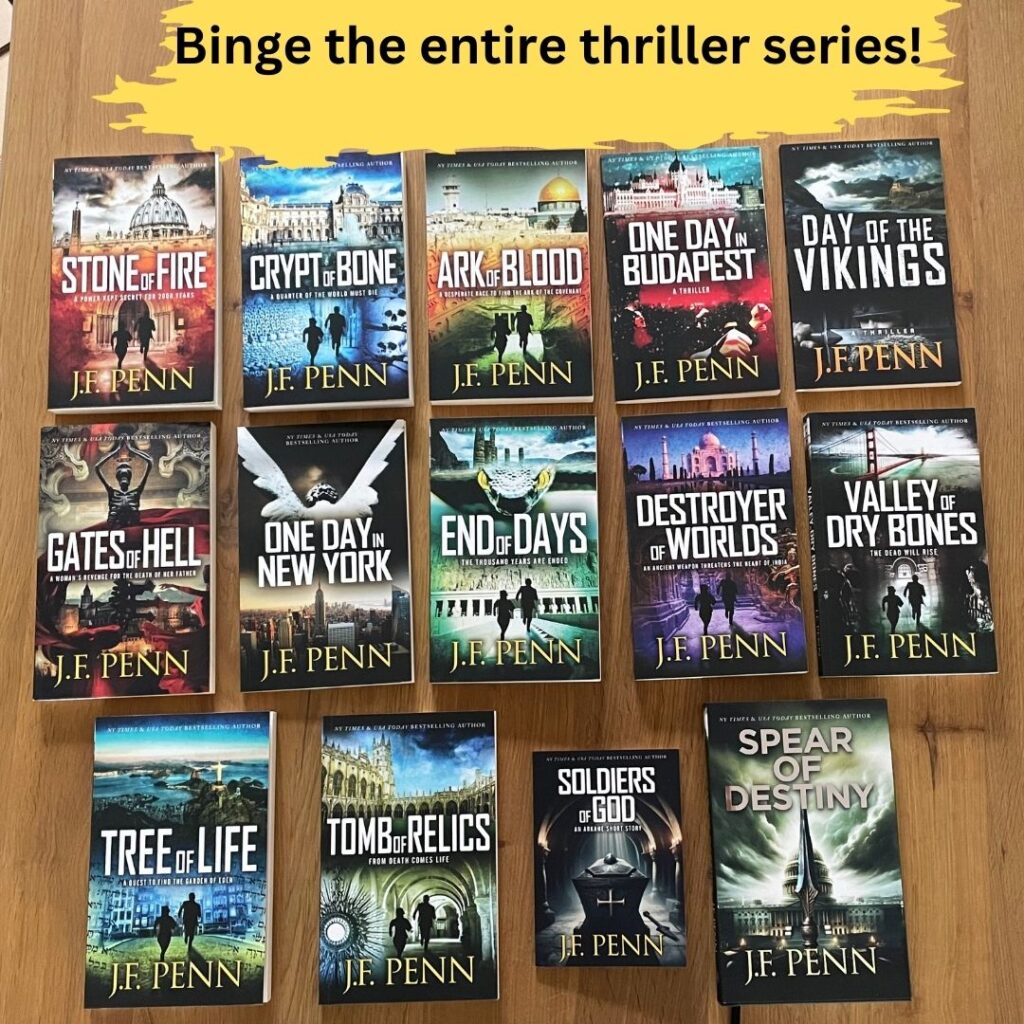
The post Writing Modern Thrillers Based On Ancient Relics and Historical Places. J.F. Penn On The Ancient Heroes Podcast first appeared on The Creative Penn.
Go to Source
Author: Joanna Penn

